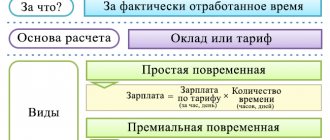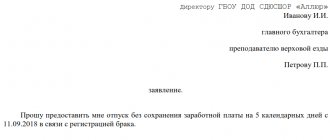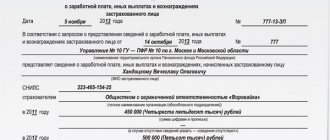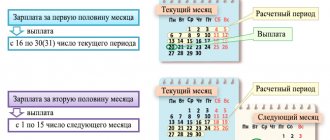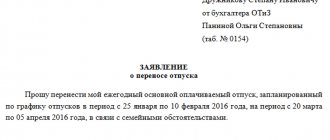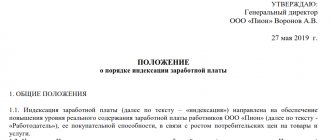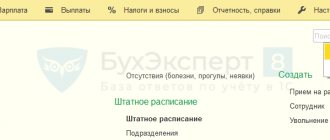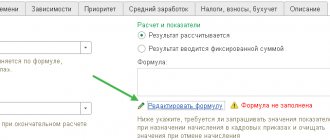When leave without pay is granted under the Labor Code of the Russian Federation
Leave without pay within the meaning of Art. 128 of the Labor Code of the Russian Federation is provided primarily in connection with the personal circumstances of the employee. Leave must be given in the following cases:
- birth of children;
- marriages;
- death of loved ones.
As for the employee’s other personal situations, the employer can give him leave himself if he deems it necessary.
In addition, the Labor Code of the Russian Federation provides for additional free time:
- for disabled workers;
- working pensioners;
- veterans.
Features that workers should remember
Management does not have the right to send an employee on vacation without pay on their own initiative if, for example, the amount of work at the enterprise has decreased or the money has run out. This is contrary to the Labor Code of the Russian Federation and will be the reason for bringing both the company and management to administrative liability under Art. 5.27 Code of Administrative Offenses of the Russian Federation.
IMPORTANT!
In connection with the situation with COVID-19 and the publication of Presidential Decree No. 206 of March 25, 2020 “On declaring non-working days in the Russian Federation,” the employer is obliged to provide employees with paid days off. If it is possible to switch to remote work and the employee does not object, this must be done, following the recommendations of the Ministry of Labor and Rospotrebnadzor. If there is no opportunity to work remotely, and the employer forces you to write an application for leave at his own expense, he is breaking the law, the employee has the right to complain to the State Labor Inspectorate.
Any duration of rest is allowed, the maximum limit is unlimited. The employee’s job must be retained for this period. But if he rests for more than 14 calendar days a year, then the 15th and remaining days are not included in the length of service giving the right to annual paid leave.
When applying for time off in the event of the birth of children, a wedding or funeral of close relatives, the employer is obliged to provide it. In addition, the legislation stipulates special guarantees for preferential categories of employees - disabled people, veterans, pensioners, single parents.
Vacation periods that the employer is required to provide
These periods depend on the reasons for leave and are specified in the Labor Code of the Russian Federation or Federal Law.
The Labor Code of the Russian Federation provides for the following deadlines:
- from 5 to 60 calendar days - according to Art. 128 Labor Code of the Russian Federation;
- from 10 days to 4 months - according to Art. 173 and 174 (for unpaid study leave);
- the estimated number of days required to comply with the required main vacation time (for example, for an external part-time worker).
According to the Federal Law, the deadlines can be:
- tied to the performance of civic duties (for example, members of election commissions are granted leave during the election period);
- are specifically defined (for holders of relevant statuses and titles, for example Hero of Labor);
- established based on the estimated number of days required to comply with the Federal Law (for example, when a military man and his wife are on simultaneous leave).
Registration of leave without saving earnings (nuances)
Vacation without pay begins to be issued, like all others, with an application. A special feature in this case is that the application must indicate the reason why leave is needed.
If leave at your own expense is mandatory, supporting documents must be attached to the application, for example:
- certificate of summons from an educational institution - for study leave without pay;
- an extract from the order (or a copy of the order) for leave for the main job - to provide additional days for external part-time work, etc.
If documents are not yet available at the time of requesting leave (for example, a birth or marriage certificate), they should still be presented to the employer after the leave (when they are ready). Otherwise, management will have the opportunity to count vacation days without saving earnings as absenteeism.
In any case, leave is issued by a separate order.
A selection of forms from ConsultantPlus will help you correctly prepare all the documents for a vacation at your own expense. If you do not yet have access to this legal system, trial access can be obtained for free.
A sample annual leave order can be downloaded here.
In subsequent calculations of average earnings, days of unpaid leave are excluded.
For calculations related to vacation experience:
- vacation days at your own expense from 1st to 14th are included in the calculation;
- days from the 15th onwards are not included.
Important! ConsultantPlus explains In this case, the end date of the working year is shifted by the number of days excluded from this length of service. In this case, in the order for the provision of annual paid leave, issued according to the unified form N T-6, in the column “for the period of work” the working year is indicated with offset dates (Letter of the Ministry of Labor of Russia dated November 23, 2018 N 14-2 / B-933, Letter of the GIT in Moscow dated 06/04/2020 N 77/10-20669-OB/18-1299). For example... You can view the example in K+ by getting free trial access.
If an employee required additional leave without pay during the probationary period (internship), the days of vacation during the probationary period (internship) are not counted.
The employer may entrust the duties of an employee who has gone on vacation to someone else or hire a temporary employee for these purposes.
An employer cannot require an employee to interrupt his vacation at his own expense. But he may refuse to take into account working days for an employee who himself decided to interrupt his vacation before it ends.
Providing leave without pay at the initiative of the employer
As noted, an employer cannot force unpaid leave without good reason. In this case, the employee can contact the appropriate authority - the labor inspectorate (LIT).
In accordance with the Code of Administrative Offenses of the Russian Federation, such a violation threatens individual entrepreneurs and officials with a fine:
- from 1000 to 5000 rub. — for individual entrepreneurs;
- from 30,000 to 50,000 rub. — for organizations (as you can see, the fines are impressively higher).
However, there are good reasons when an employer can send on a type of leave. This happens when he can no longer fully fulfill his obligations to employees or it becomes economically unprofitable. The employer may be exempt from paying wages, but is obliged to pay maintenance to all employees who are forced to take such leave. For example, in a downtime situation, payment will be at least 2/3 of the salary or average earnings for the entire “vacation” period.
Sample application for leave by agreement with the employer
Example
Employee Kovaleva I.K. is the mother of three school-age children. The enterprise's collective agreement provides for unpaid leave for up to 14 days for employees raising 2 or more children under 14 years of age (Article 263 of the Labor Code of the Russian Federation). According to the schedule, Kovaleva goes on her main vacation from 08/01/2021 to 08/28/2021 and wants to add 4 days to it at her own expense to prepare her children for school.
| AGREED: | General Director of CJSC "Metizy" A. A. Panfilov |
| Visa (decision) | To (position, full name) |
| CEO | From: adjusters |
| Manager's position | From whom (position) |
| Panfilov A. A. | Kovaleva I.K. |
| Full name of the head | From whom (full name) |
| Signature |
STATEMENT
I ask you to grant me additional leave without pay from 08/29/2021 to 09/01/2021 in connection with the preparation for school of children born in 2005, 2008 and 2010 (based on clause 10.12 of the collective agreement)
| I. K. Kovaleva | ||||||||
| date | Personal signature | Full name | ||||||
If you need to take a day off at your own expense
There are 3 options to write an application for a day off:
- At the expense of the employer, when the non-working day is paid.
- At your own expense, when the non-working day is unpaid.
- Due to days of annual paid leave.
Option one
An employee writes an application for time off at his own expense in the name of the employer if he:
- worked on a weekend or holiday;
- was involved in work beyond the normal time limit;
- donated his blood.
You must indicate one of the reasons and the day on which time off is required.
In this case, the employer is obliged to issue an order, familiarize the employee with it and let him rest.
In the time sheet, such days are marked with the letter code OZ or the digital code 17.
Option two
The employee writes a statement indicating the reason for the planned absence, its duration and the date of departure. The employer, if he considers the reason valid, issues an order to provide a day of rest, introduces the employee to it and releases him. The manager decides whether such days are considered days off or not.
In the timesheet, such days are marked with the letter code DO or the digital code 16.
Here is a template for an application for leave at your own expense, use it to contact your employer:
| To the manager __________________________ _______________________________________ from _____________________________________ _______________________________________ Statement Please grant me unpaid leave from _____________ for a period of _____ days due to _______________________________________ (specify the reason). |
If the manager considers the reasons unjustified, he has the right to refuse additional days off by writing “Refuse” on the employee’s application.
This is what an application for time off looks like if a person needs to attend a funeral:
Option three
This is something between the first and second options, when there are no formal grounds or good reasons to take time off.
The employee turns to his employer with a request to provide him with one or more days towards the main annual paid leave. If the manager agrees to this, the employee receives the requested days of rest, and it is important for the HR department to do everything correctly:
- Make changes to the vacation schedule.
- Notify the subordinate at least two weeks in advance about his upcoming vacation (and if this happens suddenly and the personnel officer does not have time, the manager violates the law).
- Issue an order and familiarize the employee with it.
- Accrue and pay vacation pay three days before his departure.
And this is what a sample application for leave without pay for 1 day for family reasons looks like:
Results
Leave without pay is a measure to support employees in cases where it is not possible to take other types of leave, but free time is necessary. Both employees and employers should be aware of the legal requirements regarding such leave.
Sources: Labor Code of the Russian Federation
You can find more complete information on the topic in ConsultantPlus. Free trial access to the system for 2 days.
When is unpaid leave granted?
According to Art. 128 of the Labor Code of the Russian Federation, leave of this type can be granted:
- At the discretion of the employer (but after considering the reason why the employee requests unpaid leave and his production capabilities, he may decide to refuse to provide such leave).
- By force of law (when an employer cannot refuse to provide an employee with leave without pay).
Therefore, before making a decision to refuse to grant leave to an employee, you need to not only take into account production issues, but also check whether he belongs to the category of employees who cannot be denied leave.
Let's say a few words about unpaid leave by decision of the employer. Part 1 of Art. 128 of the Labor Code of the Russian Federation establishes that for family reasons and other valid reasons, an employee, upon his written application, may be granted leave without pay, the duration of which is determined by agreement between the employee and the employer. From this rule we can conclude that the mandatory conditions for granting such leave are appropriate circumstances, a written statement from the employee and the consent of the employer.
Let us note that the employer, when deciding to grant leave, at his own discretion evaluates the reasons why the employee requires leave, and if he considers them insignificant or disrespectful, he has the right to refuse. We recommend that you approach this issue objectively, since in the event of a dispute, the court or regulatory authority may side with the employee. For example, the Perm Regional Court considered a case on declaring an order to apply disciplinary measures illegal. B. applied to her employer for unpaid leave for a day, without indicating the reason why it was required. Accordingly, the employer refused to provide leave, but B. did not return to work. For this she was reprimanded. The court, having examined the case materials, found out the reason for the absence - the need to appear at the prosecutor's office and the court (the summons was documented with the relevant documents) - and declared the order to apply a disciplinary sanction illegal (Appeal ruling of the Perm Regional Court dated August 12, 2013 in case No. 33-7452).
Of course, the court does not always side with the employee. If he does not show up for work after the employer refuses to provide unpaid leave, the court may recognize the application of disciplinary measures up to and including dismissal for absenteeism as legal and justified (see, for example, Determination of the Moscow City Court dated September 8, 2015 No. 4g/8 ‑8669/2015, Appeal ruling of the Omsk Regional Court dated 09/02/2015 in case No. 33‑6239/2015).


